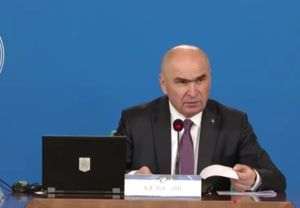The National Bank of Romania (BNR) is getting ready to suspend the voting rights that Greek banks have as shareholders of some of the Romanian banks, if the former defaulted, according to Nicolae Cinteză, the head of the Financial Oversight Division of the NBR.
In his opinion, the measure would be a very good one, for the parent banks as well as for the subsidiaries, because it would protect the investments in Romania.
The statements of the NBR official come as ratings firm Standard & Poor's Ratings Services cut the long term rating for the top four Greek banks - National Bank of Greece, Piraeus Bank, Alpha Bank and Eurobank -, which are present in Romania as well, from CCC plus to CCC.
Specialists from S&P stress the fact that Greek banks could enter into default within the next 12 months, in the absence of an agreement between the Greek government and its international creditors, as the current program is nearing its end. Quoted analysts think that there is a high likelihood of capital restrictions being implemented, "to end the tax reduction phenomenon".
Recently, in the context of the crisis that Greece is going through, the NBR has taken an unprecedented measure - it advised Romanian banks with Greek shareholders to conclude a compensation agreement with their shareholders, which would prevent the latter to withdraw their deposits from Romania, in the event of capital controls. According to Nicolae Cinteză, the institutions in Romania have heeded the advice of the Central Bank and have concluded that kinds of agreements with the parent banks.
Mentioning that the Romanian Central Bank is constantly monitoring the situation in Greece, Nicolae Cinteză told us: "If capital controls were implemented in Greece, the Greek subsidiaries in Romania would no longer be allowed to draw on the amounts they have placed with their parent banks, and the latter could also withdraw their deposits which they have in the Romanian banks. To prevent that from happening, we have asked the banking institutions with Greek shareholders to conclude an agreement with the parent banks, in order to compensate the exposures of our distressed banks with the amounts drawn from the shareholders. There would only be a small part to pay, which would not pose any problems".
This way, both parent banks and their Romanian subsidiaries are protected, said Mr. Cinteză: "The only problem is that the parent bank sees capital movement restrictions, it would no longer provide liquidity to its subsidiary, and according to the regulation, if the subsidiary needs funding, it can ask for money from the parent bank".
Lately, Greek officials have repeatedly warned that if they do not reach an agreement with the international financial institutions, they won't be able to repay the loans they've taken from them.
Greek prime-minister Alexis Tsipras yesterday said that Greece is ready to "wait patiently" until the international creditors "come back to reality" when it comes to their demands from the Greeks, according to AFP.
Guenther Oettinger, the European Commissioner for Economy and Digital Society said that the EU needs to get ready for the "state of emergency" in Greece, due to the risk of the country defaulting.
Speaking of the situation that has been created between Greece and the international financial institutions, economic analyst Ionel Blănculescu considers that "we are witnessing a muted fight between the Tsipras government and the EU, in which a compromise is being sought".
In his opinion, that is why the two parties seem to be so willing to wait: "Time can be left to decide in certain cases, but Greece doesn't have much of it, because it has constant obligations to meet. That is why the government is stalling, trying not to break the promises it made in its campaign, as well as to allow for a compromise, seeking another cut of the debt".
Blănculescu can not accept a new compromise, because it would set numerous precedents and encourage that kind of moves.
"If we look back at history, we see that Argentina has been trying for 14 years to convince its debtors to cut its debt. This makes us think that what is happening in Greece now could take a long time as well", said Ionel Blănculescu.
Even though he thinks that Greece going into default is almost unavoidable, he says that if that were to happen it would cause major losses on a European level, as estimates show that in Europe there are open positions worth approximately three thousand billion Euros, which include bets involving banks, investment funds and other financial institutions.
"In Greece there is a state of agony which is ongoing and which could lead to the population rioting against the government", said Ionel Blănculescu.
S&P warns that a new downgrade of the biggest Greek banks may follow, if it comes to the conclusion that capital controls could be implemented. The firm may cut the rating of Greek banks and if they lose access to the liquidity provided by the European Support Mechanisms, or if it notices that this support is insufficient to cover the funding needs of the four banks.
In May, ratings firm Moody's Investors Service revised its outlook on the Greek banking system from "negative", to "stable", further saying that there is a "high likelihood" of Greece implementing capital controls.
In April, the Greek government decided to force the local administrations to transfer their deposits from the commercial banks to the central bank. The idea that banks could be shut down and nationalized was also discussed.
A potential situation of panic in Greece could spread to many other countries, including Romania, says economic analyst Aurelian Dochia, administrator at BRD Groupe Societe Generale.
The biggest threat for countries such as Romania is the risk of the population withdrawing their money from banks, because "the way people are going to react is unknown", Aurelian Dochia recently told us.
According to Nicolae Cinteză, the Greek subsidiaries in Romania have a very good asset quality and "very, very good provision ratios", with all of the four banks having an solvency ratio above 12%.
In spring, Nicolae Cinteză said: "In the event of deposit withdrawals, I am convinced that the NBR would agree to act as the lender of last resort, because the banks in question have sufficient government bonds, which would allow them to handle massive deposit withdrawals".
Florin Georgescu, first deputy governor of the Central Bank, said, at a conference organized by BURSA, that the Romanian banking system would withstand possible troubles caused by the financial situation in Greece.
He stressed: "The NBR has the whole toolset, it has sets of procedures and instruments to handle very well potential financial distresses on the Greek market. The banks in our banking system, especially those with Greek capital, are well capitalized, they have good liquidity, they have an asset structure that is diversified and adequate to the needs that arise when dealing with more difficult situations. The NBR has a set of measures and procedures which, in partnership with the banks which might need a certain support, could be launched in order to avoid any tensions and unfavorable effects in the Romanian banking system".
According to the NBR, at the end of 2014, Greek capital accounted for 17.6% of the total banking system, while Greek shareholders accounted for 21.8% of the total foreign equity.






























































